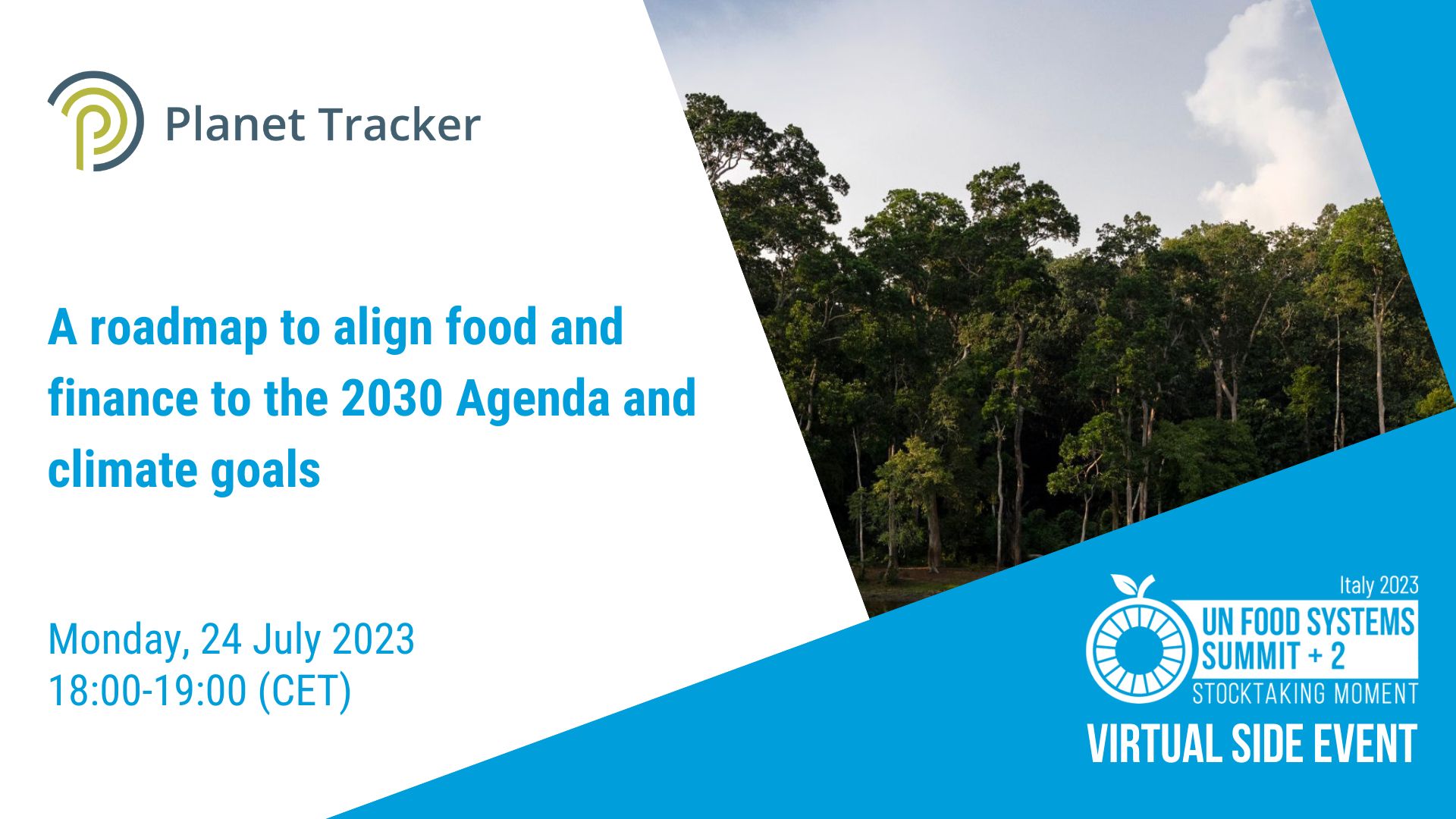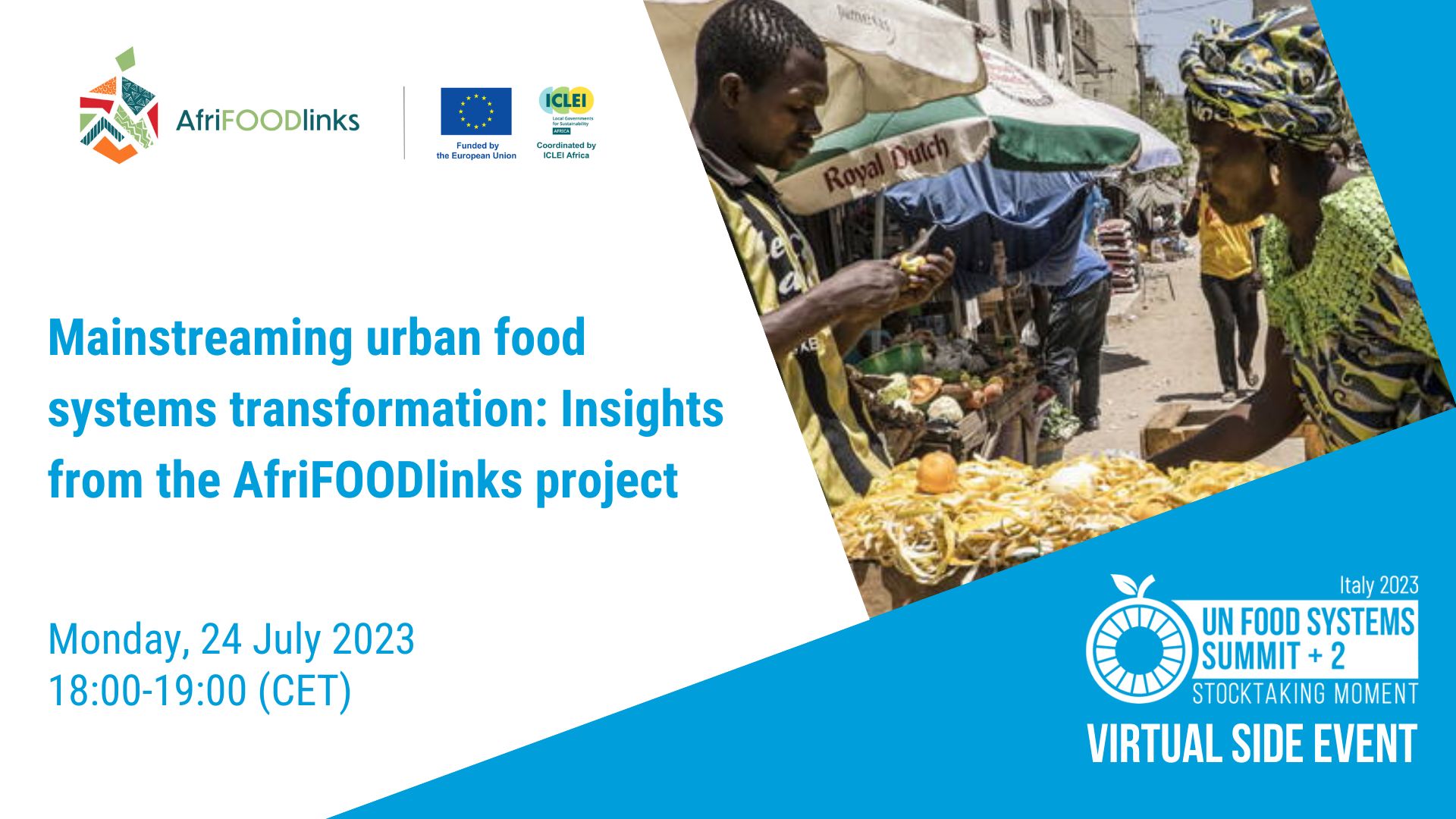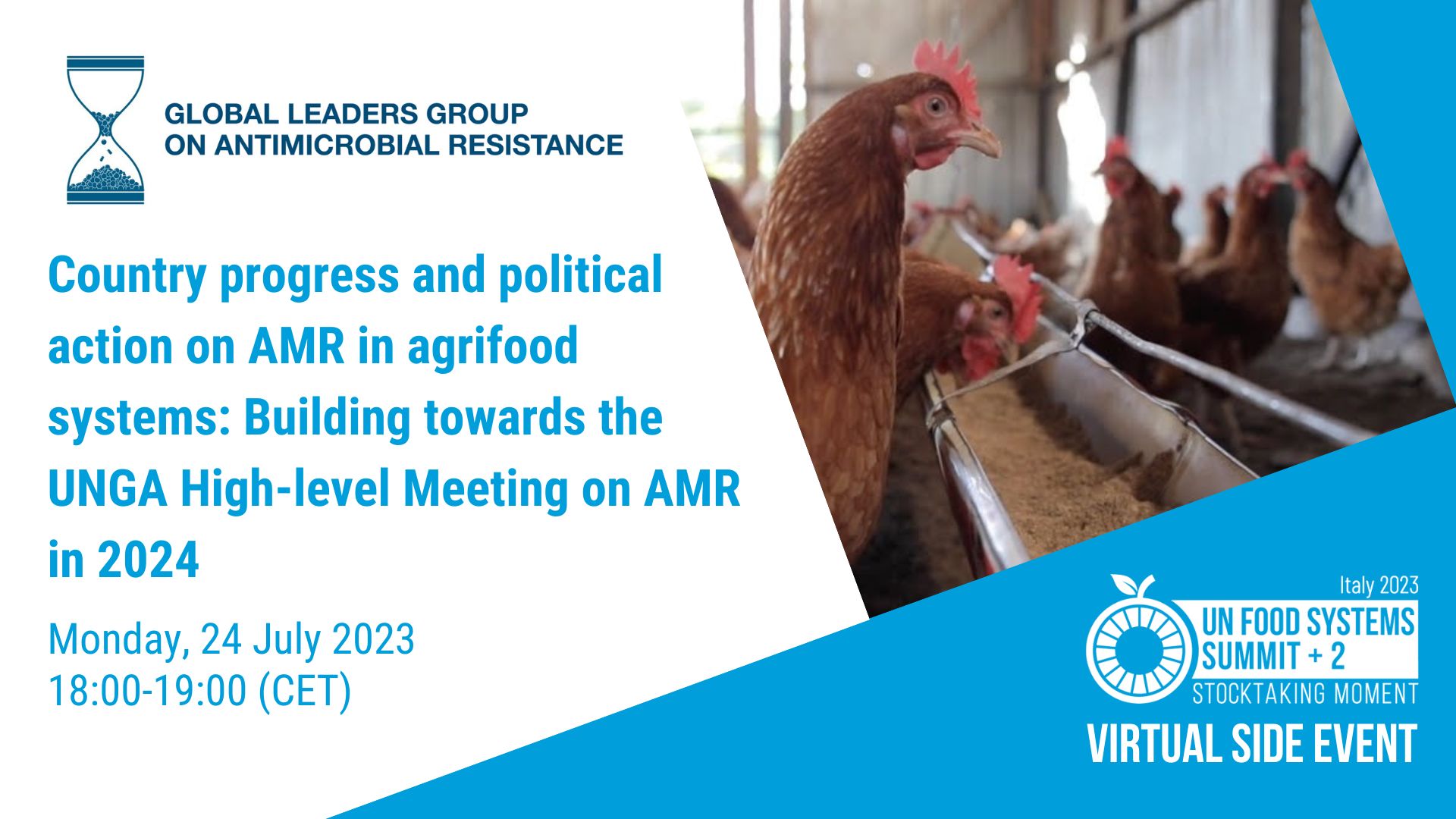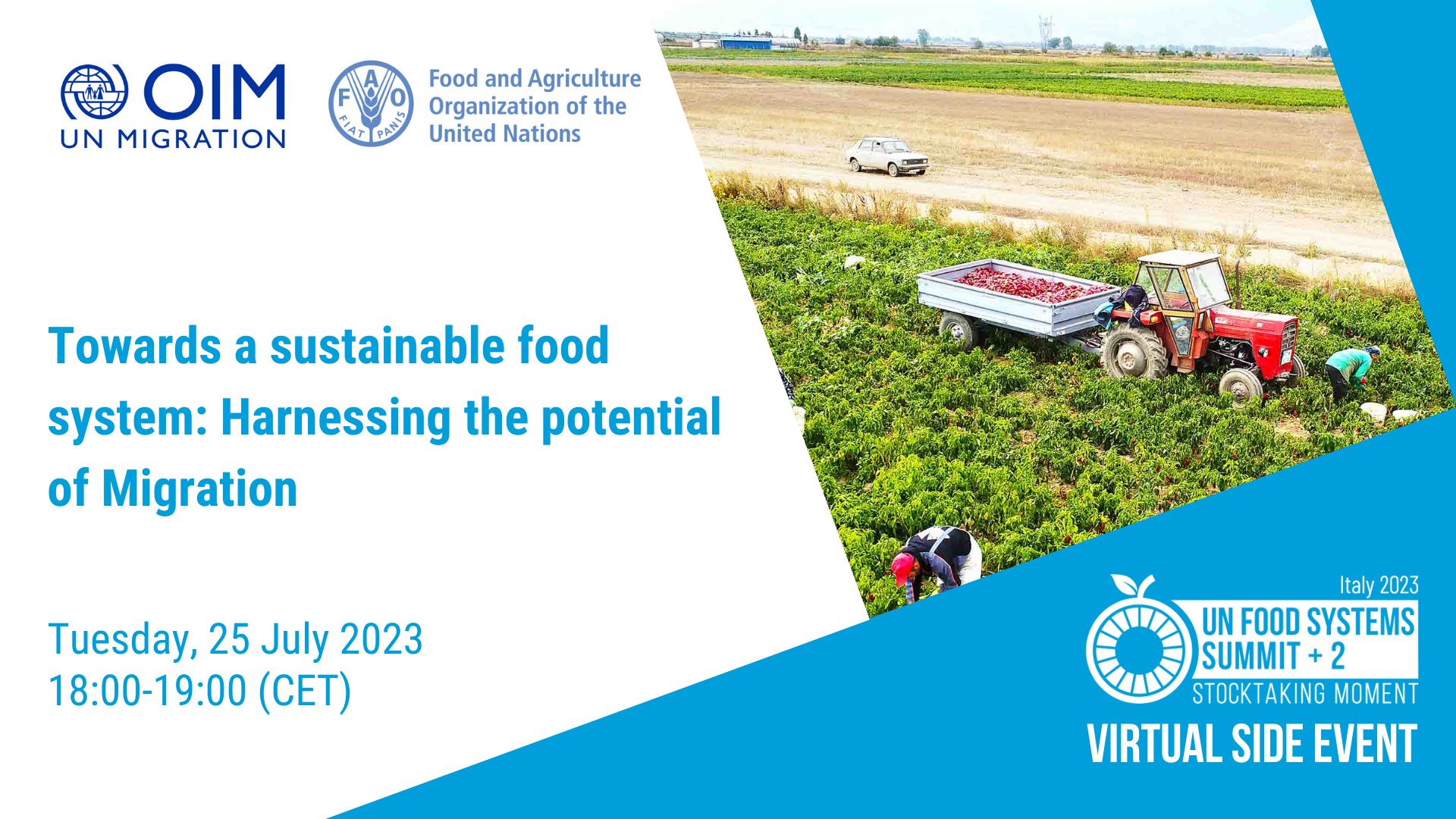Side Events at the UN Food Systems Summit +2 Stocktaking Moment
The formal programme of the UN Food Systems Summit +2 Stocktaking Moment is complemented by a range of side events on thematic issues related to food systems transformation.
Monday, 24 July 2023
Midday: In-person/hybrid side events
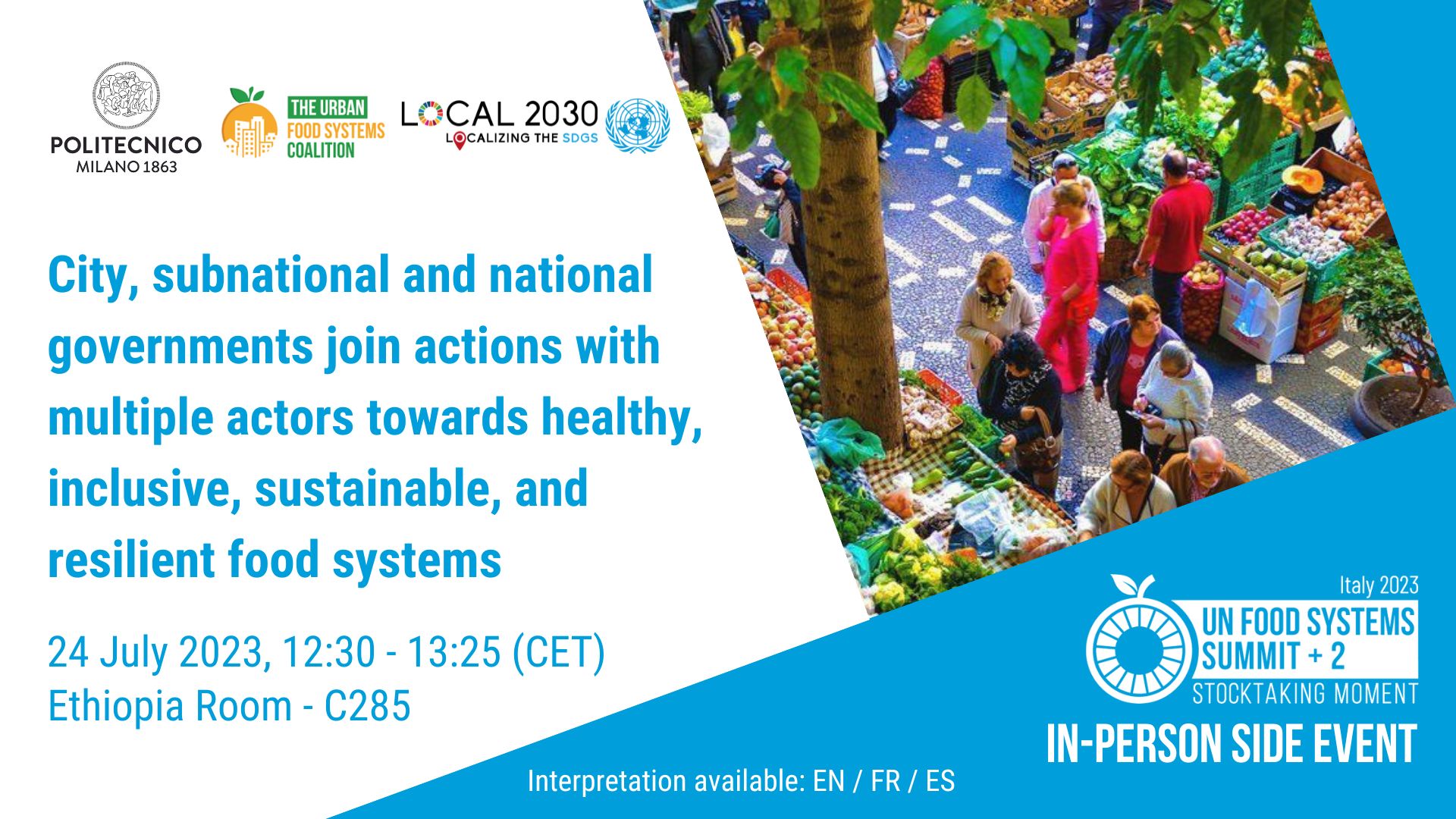
Watch this side event here.
Lead organizers: Coalition on Sustainable and Inclusive Urban Food Systems / LOCAL2030 COALITION / Politecnico di Milano
Co-organizers: Coalition of Action on Healthy Diet from Sustainable Food Systems for Children and All (HDSFS) / Food is Never Waste Coalition / Resilient Local Food Supply Chain Alliance / Global Taskforce of Local and Regional Governments / City of Milan / Self Employed Women’s Association / Government of Switzerland / Government of Spain / Global Task Force of Local and Regional Governments/ UNITED CITIES AND LOCAL GOVERNMENTS (UCLG) / UN-HABITAT / UNDP / FAO / 3rd Working Group of the National Council for Development Cooperation (CNCS) / ACRA Foundation Italy / European Food Banks Federation (FEBA) /Hawai'i Green Growth (Local2030 Hub) / Milan Urban Food Policy Pact
Read more about this side event: Information leaflet
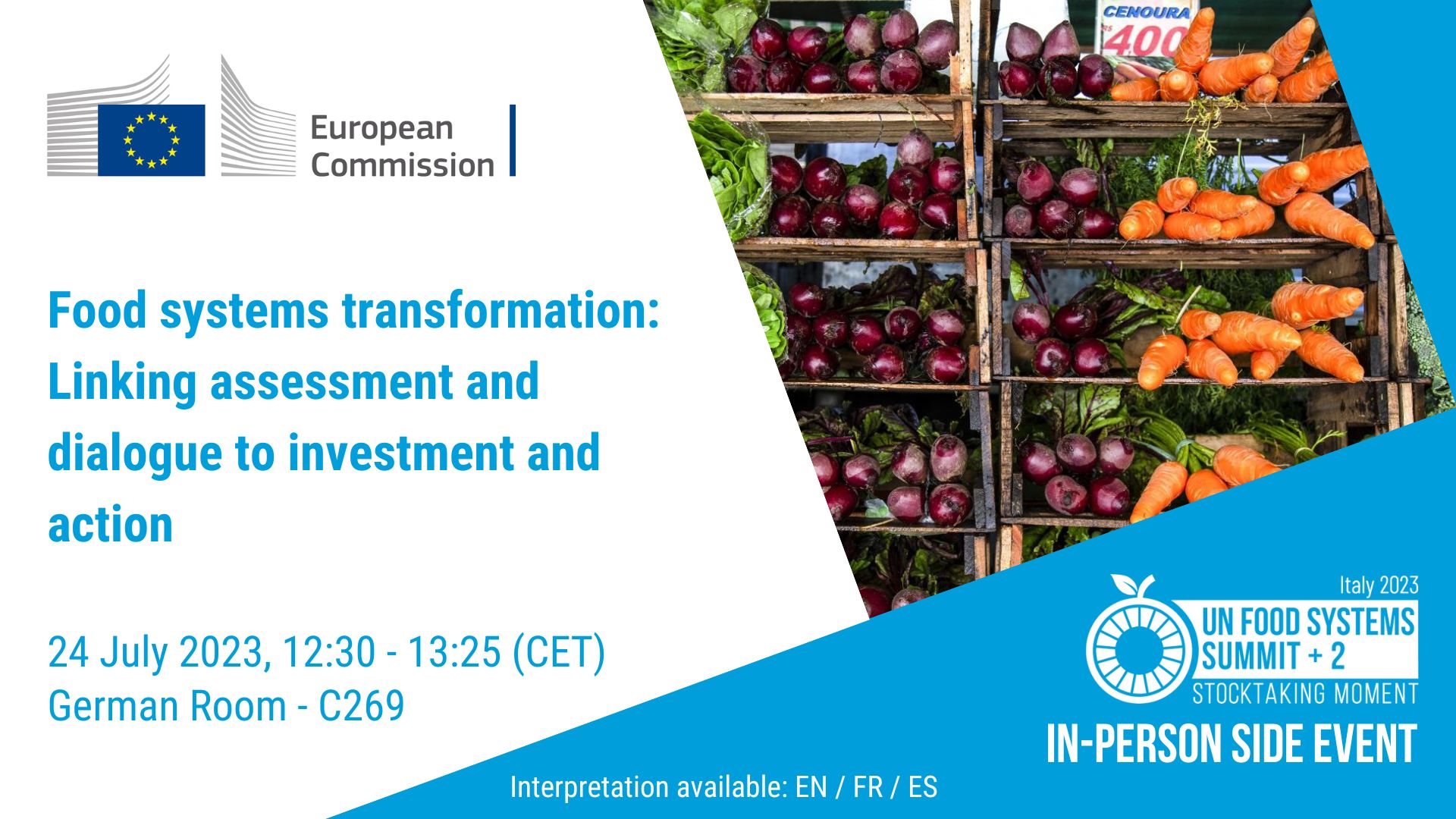
Watch this side event here.
Lead organizer: European Commission, Directorate-General for International Partnerships (INTPA)
Co-organizers: FAO Investment Centre / IFAD / Government of Sierra Leone / Government of Bhutan / Ecociate Consultants
This side event shares valuable experiences and lessons on government collaboration with diverse stakeholders to translate national food systems’ assessments and pathways into action. It focuses on policy and investment for transformative interventions at scale to change the sustainable trajectory of food systems. It showcases Sierra Leone, Bhutan, and India experiences addressing climate change, inclusion, food security, and nutrition. In this event, participants can gain insights into mobilizing political will and engaging stakeholders, diverse Ministries and financial partners effectively for successful implementation.
Read more about this side event: Information leaflet
.jpg?sfvrsn=6f6d1fca_1)
Watch this side event here.
Lead organizer: Agroecology Coalition
Co-organizers: Coalition of Action 4 Soil Health / Coalition of Action on Healthy Diet from Sustainable Food Systems from Children and All / Food is Never Waste Coalition / federal Office for Agriculture, Government of Switzerland
With over 1/3 of the Earth’s surface being degraded, the ecosystems’ ability to produce healthy and nutritious food is limited. A powerful lever, agroecology provides sustainable solutions to issues of soil degradation, climate, biodiversity, food security and nutrition, including precarious livelihoods and social inequalities, faced by farmers and food system workers.
Featuring country experiences and approaches, this Side Event aims to better understand linkages between healthy soil and healthy food and the role of agroecology and bio-circular economy in producing food that is healthy for people and the planet. It hopes to inspire actors to take aligned actions, strategies and policies that embrace integrated approaches and leverage synergies.
Read more about this side event: Information leaflet
.jpg?sfvrsn=5f4bb802_1)
Watch this side event here.
Lead organizer: Power for All
Co-organizers: IRENA Coalition for Action / Global Solar Council / FAO / National Solar Energy Federation of India
Globally, fossil fuels provide about 70-80% of the energy used in agri-food systems (FAO). In terms of the consumption of energy, food systems are a major source of demand as they account for 30% of all energy consumed in the world (IRENA and FAO). Most consumption (70%) takes place in post-harvest stages such as transportation, processing, packaging, shipping, storage, marketing, etc., and is driven by high-income countries (FAO). The over-reliance on fossil fuels to power the food systems has severe environmental implications. In 2019 global agri-food system emissions were 16.5 billion metric tonnes, corresponding to 31% (range: 19 %–43 %) of global GHG emissions for that year. The use of energy contributed to about one-third of the total greenhouse gas (GHG) emissions from food systems.
In Africa and India’s context, most of these emissions are predominantly due to the increased use of diesel and other fossil fuels in pre-harvest and post-harvest activities. Agriculture is currently a large contributor to climate change as well as one of the economic sectors most at risk from it. But it doesn’t have to be this way. Productive Use of Renewable Energy (PURE) can support Africa’s agriculture to become a low emission- climate resilient food system, Africa’s agriculture sector can transition away from being a major emitter to becoming a carbon sink that takes carbon out of the atmosphere and stores it in soil and biomass. Renewable energy sources like solar power can greatly benefit the agribusiness sector. Solar water pumps can provide a sustainable solution for irrigation in remote areas, reducing the reliance on fossil fuel-based generators. Solar-powered cold storage facilities, for instance, can help reduce post-harvest losses by maintaining optimal temperatures for agricultural production. These facilities can be easily deployed in remote areas with limited access to electricity, providing a sustainable and cost-effective solution for preserving production. Additionally, solar-powered cold storage can help maintain the quality and nutritional value of food, leading to improved marketability and higher income for farmers.
This event will aim to reinvigorate the global discussions around the potential of renewable energy in enhancing agricultural productivity, reducing post-harvest losses, and boosting rural incomes while addressing GHG and climate change. The UNEP Cool Coalition along with the UAE delegation will be giving an overview of the Global Cooling Pledge and its importance in Food Systems.
Read more about this side event: Information leaflet
.jpg?sfvrsn=cab8377e_1)
Watch this side event here.
Lead organizer: Food Planning and Monitoring Unit, Ministry of Food, Government of the People’s Republic of Bangladesh
Co-organizers: FAO / IFAD / WFP / GAIN
The UNFSS 2021 set the roadmap for linking food systems, nutrition, and resilience. This was followed by COP 26 and N4G in 2021, and COP 27 in 2022. All these forums have reiterated the importance of people and planet, and of leaving no one behind. Drawing on the Bangladesh experience, the side-event will demonstrate with examples, the significance of recognizing the interconnectedness between food systems, nutrition, and resilience, and of addressing issues with a holistic perspective, in order to meet the commitments under UNFSS, N4G, and COP, and accelerate progress towards the SDGs.
Read more about this side event: Information leaflet
.jpg?sfvrsn=8ec8843a_1)
Watch this side event here.
Lead organizer: Japan: Ministry of Agriculture, Forestry and Fisheries (MAFF)
Co-organizers: Japan International Research Center for Agricultural Science (JIRCAS) / Japanese Agriculture Company Inc. / Bangladesh Rice Research Institute (BRRI)
The objectives of this side event are to share information on the development and experiences of innovation initiatives based on the “Strategy for Sustainable Food Systems (Strategy MIDORI)” in Japan (e.g., initiatives to “visualize” efforts to reduce environmental burdens by reducing the use of chemical fertilizers and pesticides and applying biochar and compost at the agricultural production stage, and to appeal to consumers), as well as to share and discuss technology and innovation, and the best practices that will contribute to promoting efforts to transform into sustainable agriculture and food systems in the Asia monsoon region and other regions.
Read more information about this side event: Information leaflet
Afternoon: High-level event hosted by the Government of Nigeria
.jpg?sfvrsn=11a7d4dc_1)
Time: 13:30-14:30 (CET)
Room: King Faisal Room - D223/ D263
Hosted by the Government of Nigeria
Hosted by H.E. Senator Kashim Shettima, Vice President of the Federal Republic of Nigeria, this event will showcase an inspiring case of public-private financing at scale for food systems transformation that does not leave smallholders behind.
Ceres (2030) reports that transforming the food systems requires US$350 billion annually for the next decade to achieve SDG 2. An estimated USD400billion additional financing is required annually to reduce $12 trillion social, economic and environmental costs in food systems. The criticality of finance was re-emphasized at the January 2023 Feed Africa Summit, attended by leaders of government, development organizations and private sector who committed to advancing innovative food financing. The goal of this event is to leverage Nigeria’s experiences to scale up innovative financing for food system transformation.
Read more about this event: Information leaflet
Evening: Virtual side events
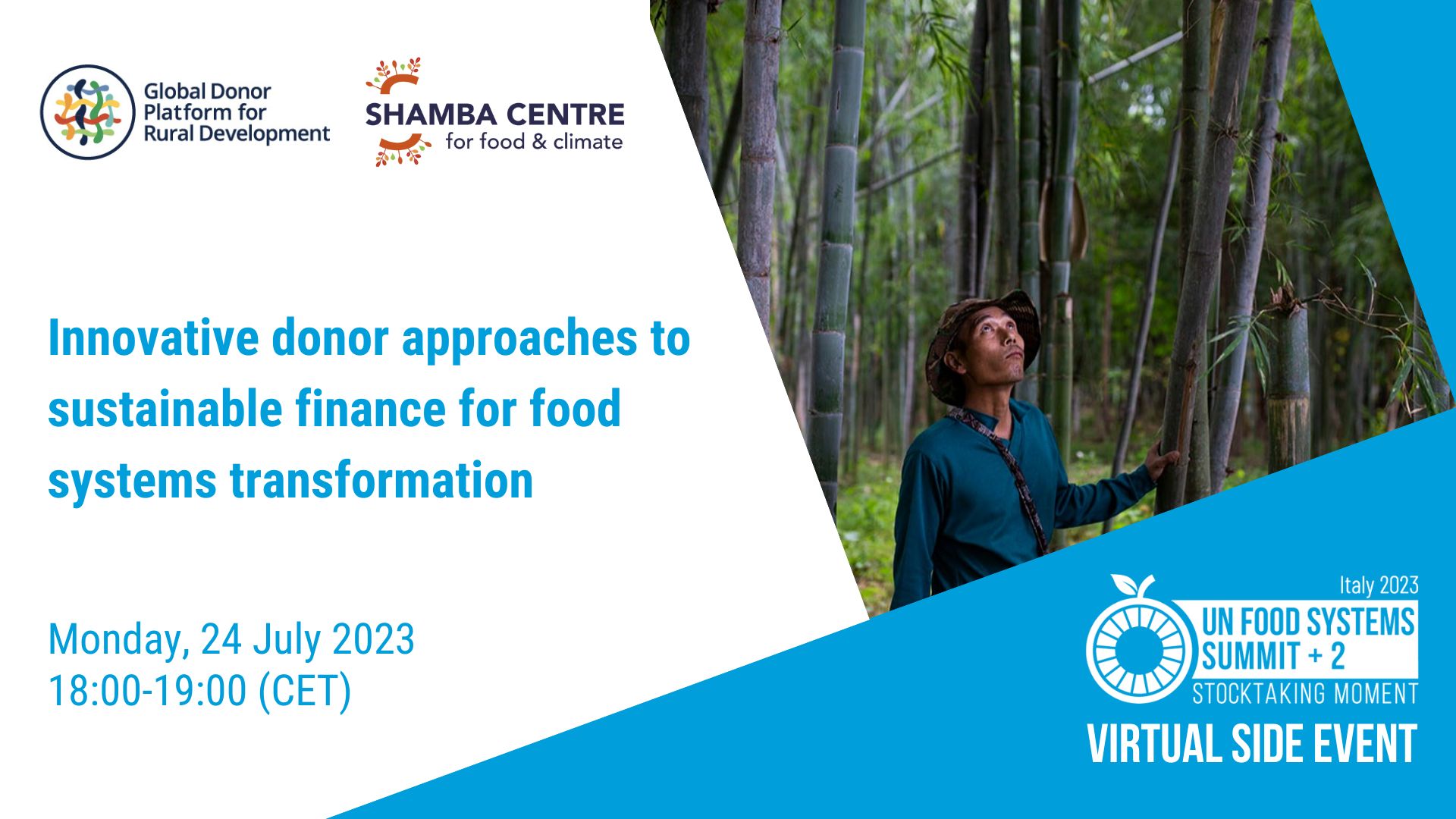
Event webpage | Registration link
Lead organizer: Global Donor Platform for Rural Development / Shamba Centre for Food & Climate
About this side event: Donors and public funds are working continuously to increase the impact of their investments with the aim to achieve the SDGs and transform our food systems. However, there remains an estimated US$330 billion funding gap needed to eradicate hunger by 2030 as detailed in the Ceres 2030 report. New sources of funding are necessary, and donors need to find new ways to make their funding more impactful and catalytic.
This side-event will provide insight from donors on how they are balancing competing demands and interests in a difficult geopolitical and economic environment. It will explore their initial steps in innovative finance including the topic of ‘pay for performance’ and blended finance. Finally, it will examine the conditions needed to ensure the success of blended funds.
Registration link
Lead organizer: Planet Tracker
Co-organizers: Food and Land Use Coalition (FOLU) / FAIRR / WBCSD / The Rockefeller Foundation
About this side event: The food system as a whole needs to follow a pathway to achieve sustainability by 2050, given its current negative impact on climate, nature and society. Unless food systems are transformed, humanity will be unable to limit temperature increases to 1.5ºC by 2050, and to restore nature and achieve the UN’s 17 Sustainable Development Goals (including ‘zero hunger’) before 2030. In particular, financial institutions need to deploy their firepower to support such transformation. If done inclusively and sustainably such a transformation could unlock $4.5 trillion a year in new business opportunities.
Registration link
Lead organizer: ICLEI Africa
About this side event: The United Nations Food Systems Stocktaking Moment aims to track progress on food systems commitments. ICLEI Africa and partners again join the UNFSS process to shine a spotlight on the critical role of urban food systems in achieving the sustainable development goals. As food systems worldwide grapple with mounting challenges to ensure food and nutrition security for all, it has become increasingly crucial to address the unique pressures faced by urban areas. With over 55% of the global population currently residing in cities, the need to prioritise the urban food agenda has reached unprecedented importance. However, urban food system commitments and action are still under-represented in the UNFSS process.
This side event will draw on the ideas and worldviews of the AfriFOODlinks project to emphasize the need and value of investing in urban food systems. It is an ambitious African-led initiative that fosters collaboration among key stakeholders from Africa and Europe to tackle the systemic causes of food insecurity and environmental impact within urban contexts. This project spearheads a transformative approach by forging connections between local government actors, researchers, civil society organizations, youth, and activists from both continents.
During this UNFSS sideline event, participants will have the opportunity to delve into the aspirations and perspectives of the AfriFOODlinks cities and partners, hearing how urban food systems challenges manifest in their cities, and what they are currently doing to address them. Join us to unlock the potential of urban food systems and hear how different cities are already driving meaningful progress toward a future in which food security and environmental sustainability are mutually reinforcing.
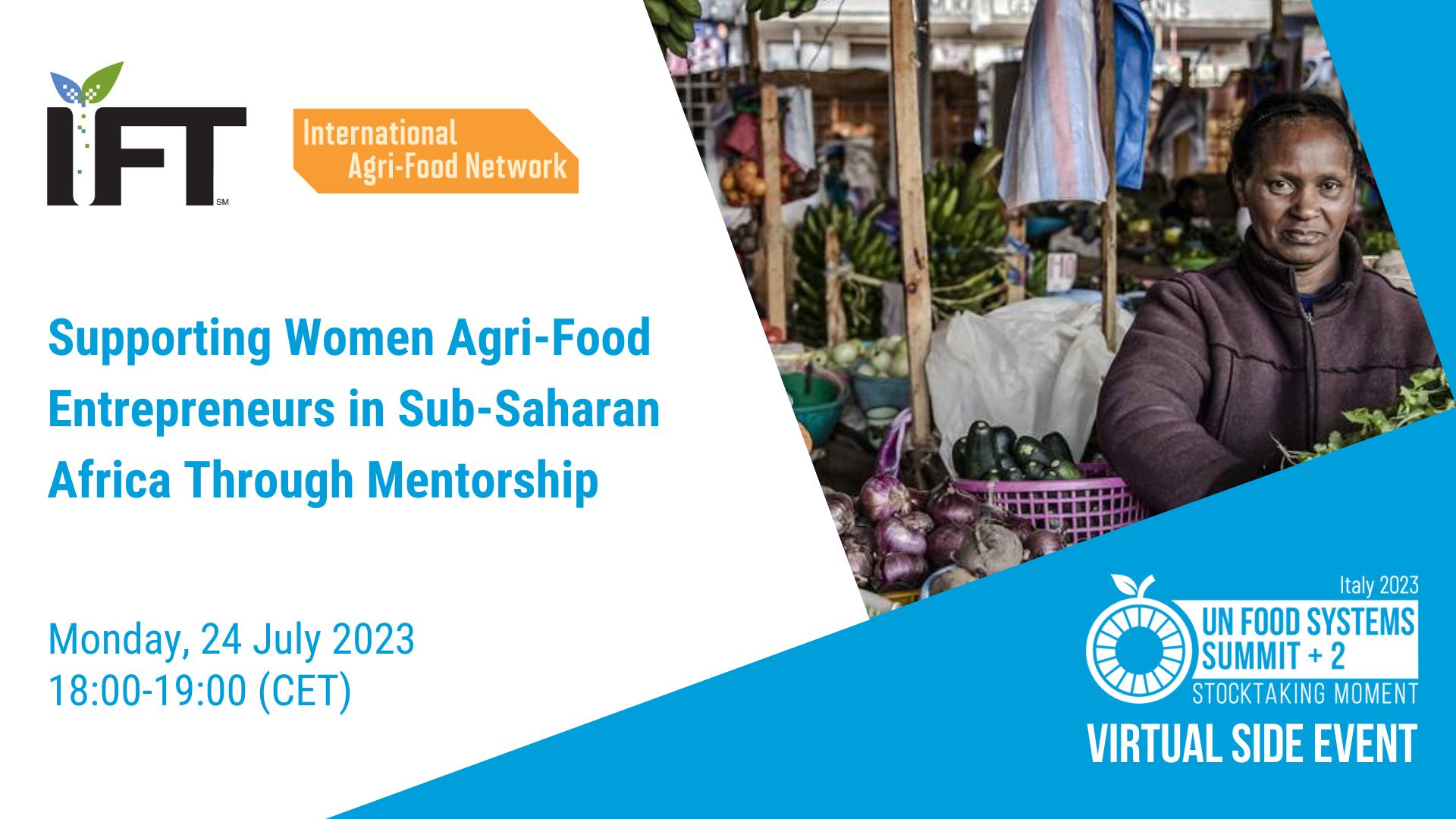
Event webpage
Lead organizers: Institute of Food Technologists / International Agrifood Network
About this side event: In Sub-Saharan Africa (SSA) women engaging in agri-food entrepreneurial activities is highest among all the African regions. African women entrepreneurs, particularly those leading small to medium enterprises (SMEs), are key drivers of development, inclusive growth, and prosperity, but often find themselves in disadvantaged positions with more restricted access to resources and assets, capacity development, financial services, and social protections than male counterparts. In 2022, the FAO and the International Agri-Food Network (IAFN) launched a pilot Accelerator Mentorship Programme to support female entrepreneurs in SSA by addressing key challenges and constraints they face in their businesses. The programme began in October of 2022 and included a cohort of 50 female entrepreneurs. Mentors include business leaders and managers, particularly women, in different fields across the agrifood value chain, from FAO and IAFN members. This session will discuss the successes and learnings of the programme and include mentors and mentees perspectives.
Registration link
Lead organizer: Global Leaders Group on AMR
About this side event: This session organized by the Global Leaders Group on AMR aims to achieve: better understanding of challenges and country priority actions on AMR within agrifood systems and national agrifood systems transformation pathways; peer exchange on practical approaches to reduce need for antimicrobials in the agrifood systems applying a One Health approach; and discussion on the way forward based on GLG priority areas and upcoming UNGA 2024 HLM on AMR, priority actions to support reducing the need for antimicrobials from farm to fork for a more sustainable, resilient, inclusive, and efficient agrifood systems.
Evening event: SDG Action Awards Ceremony
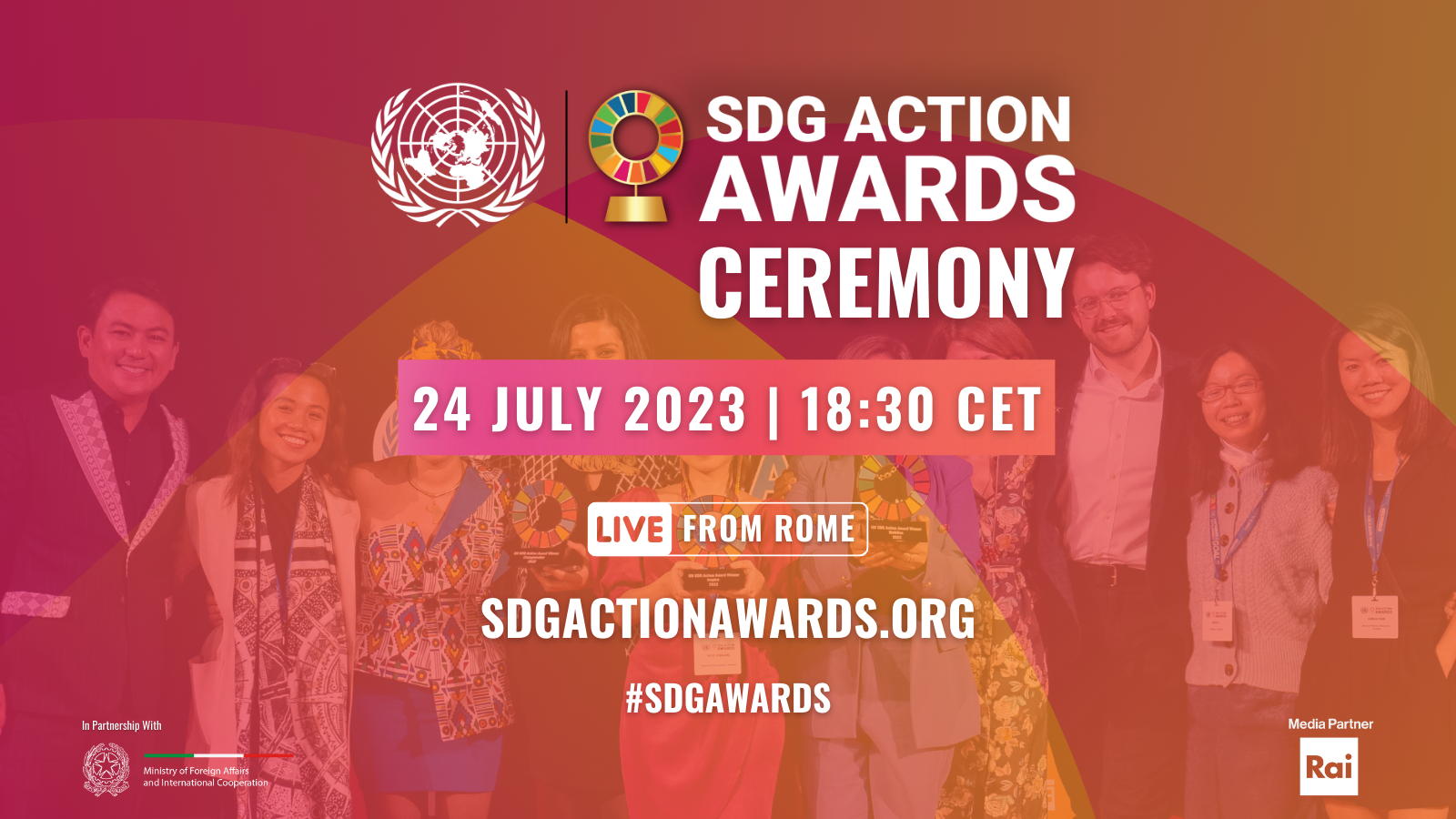
Time: 18:30-19:30 (CET)
Room: Plenary
Tune in Live to the 2023 UN SDG Action Awards Ceremony which will recognize and honour SDG changemakers from around the world.
From Estonia and Brazil to Colombia and Tanzania, the 2023 UN SDG Action Awards finalists show the world what it means to unite to act for the SDGs and make change happen for a more sustainable future for all.
This vibrant awards ceremony will include performances from UNCCD Goodwill Ambassador and musician, Inna Modja, Nigerian singer-songwriter, Chioma ''Cill'' Obgonna, and Italian superstar, Mr. Rain.
Read more:
#ACT4SDGs @SDGaction
Tuesday, 25 July 2023
Morning: Virtual side events
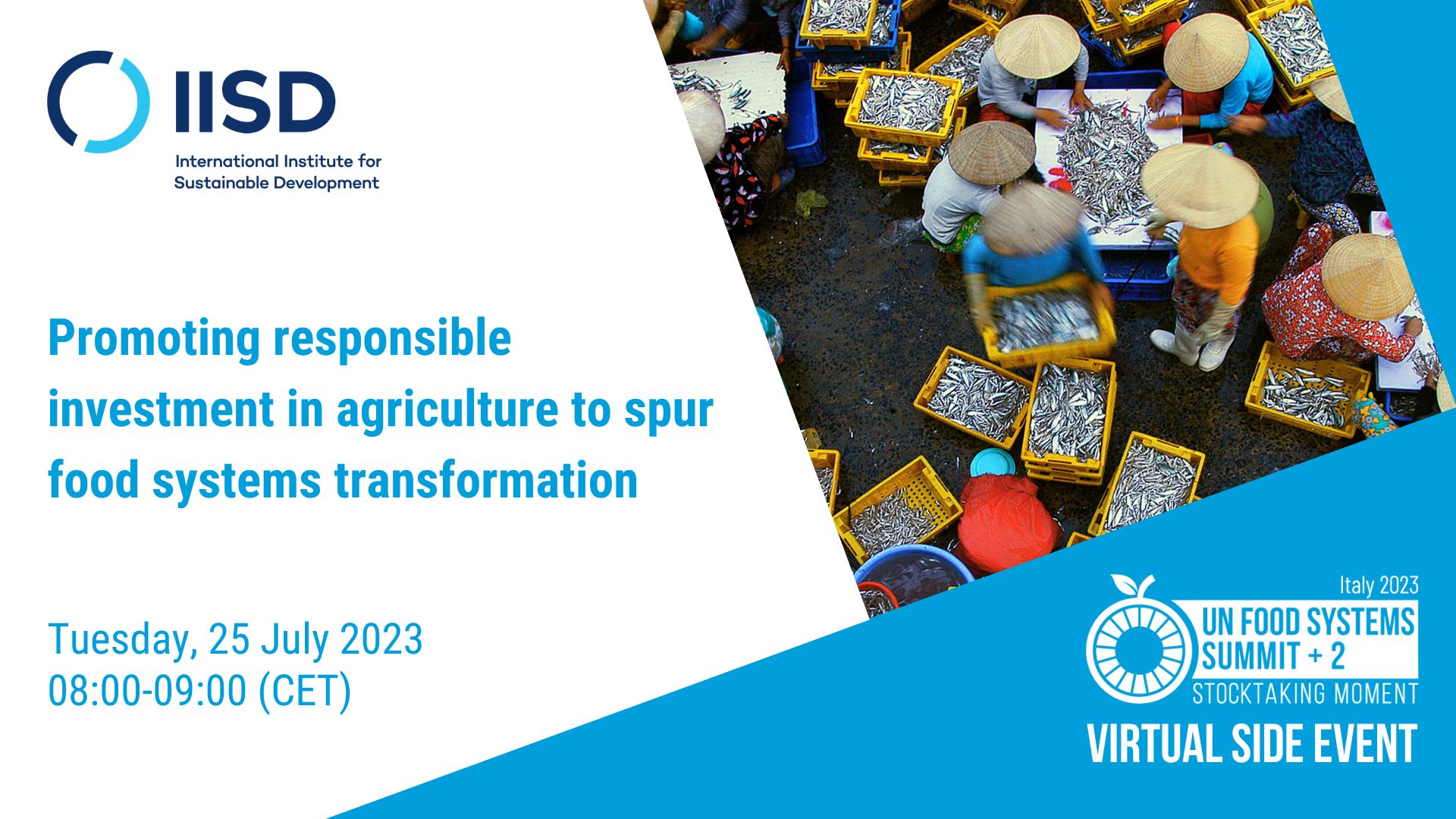
Event webpage | Registration link
Lead organizer: International Institute for Sustainable Development (IISD)
About this side event: This side event will provide an opportunity for representatives from the governments of Kenya and Indonesia to share their experiences in promoting responsible investment in agriculture and explain how these efforts support national food system transformation and sustainable development objectives. Representatives from the private sector and CSOs will also provide insights into how they engage with and support such investment. We will reflect on how their collective efforts can lead to legal, policy, and institutional environments that are conducive to responsible investment goals.
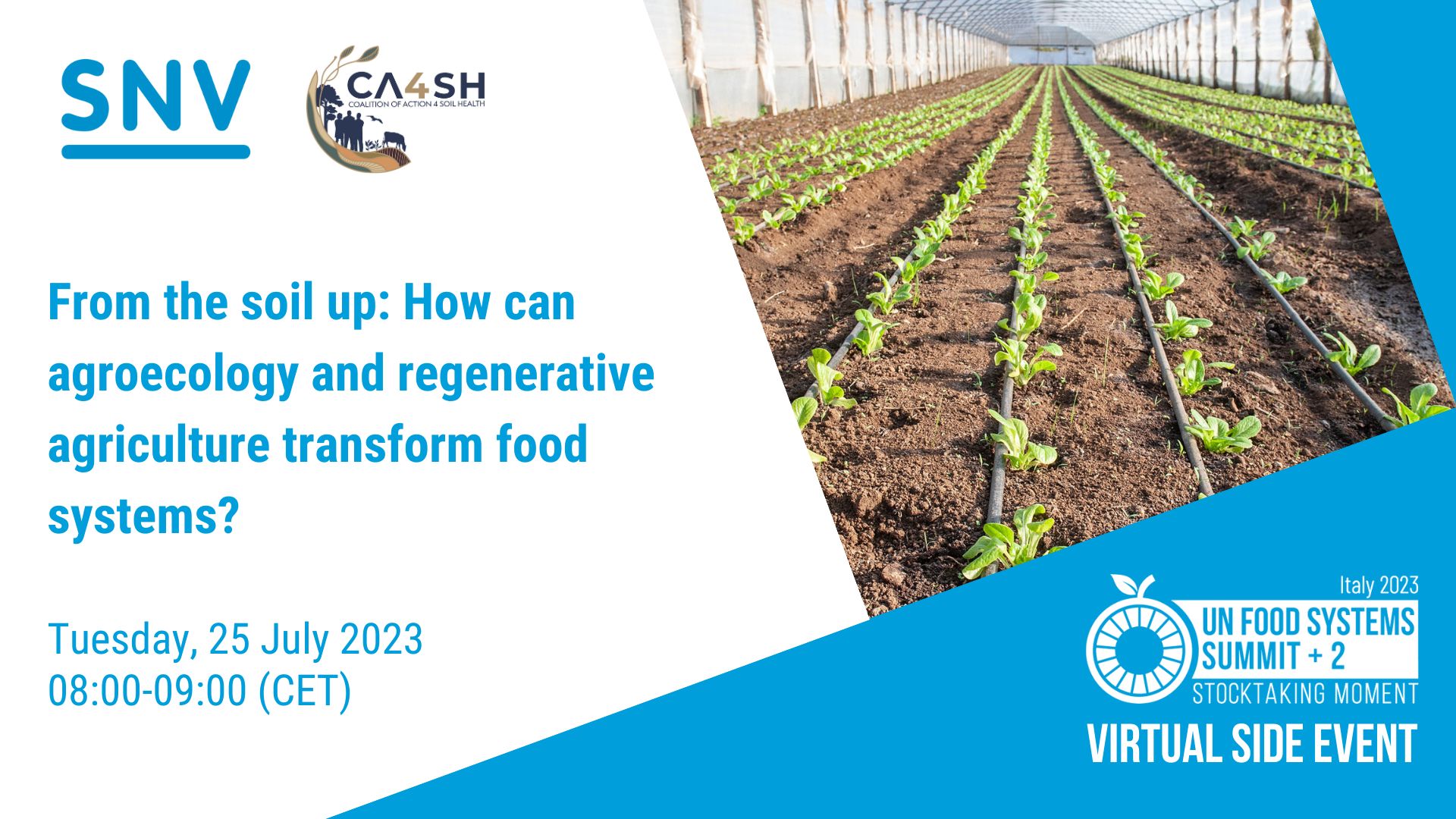
Registration link
Lead organizer: SNV Netherlands Development Organisation
Co-organizer: Coalition of Action 4 Soil Health (CA4SH)
About this side event: Land degradation continues to negatively impact 3.2 billion people. Agroecology and regenerative agricultural systems can be part of the solution, providing safe and nutritious food, enhancing above and belowground biodiversity, storing carbon, and improving water storage and cycling. Join us for an exploration of the transformative power of agroecology and regenerative agriculture on our food systems. This webinar tackles the urgent issue of land degradation and highlights the potential of these sustainable systems to contribute to ecosystem restoration. Our objectives are manifold: we aim to raise awareness, showcase collaborative action, highlight impactful evidence, and call for more investment in these eco-friendly farming systems. Our audience will gain crucial insights into the role of these systems in aligning nature, people, and prosperity, as well as their significance in achieving the Sustainable Development Goals (SDGs). We aim to deliver a deeper understanding of the importance and scalability of agroecology and regenerative agriculture. We will collectively identify bold policy actions and practices, aiming to foster an environment conducive to supporting, financing, and scaling agroecosystems. Together, we will chart a comprehensive roadmap for multistakeholder action in creating a resilient and sustainable food system.
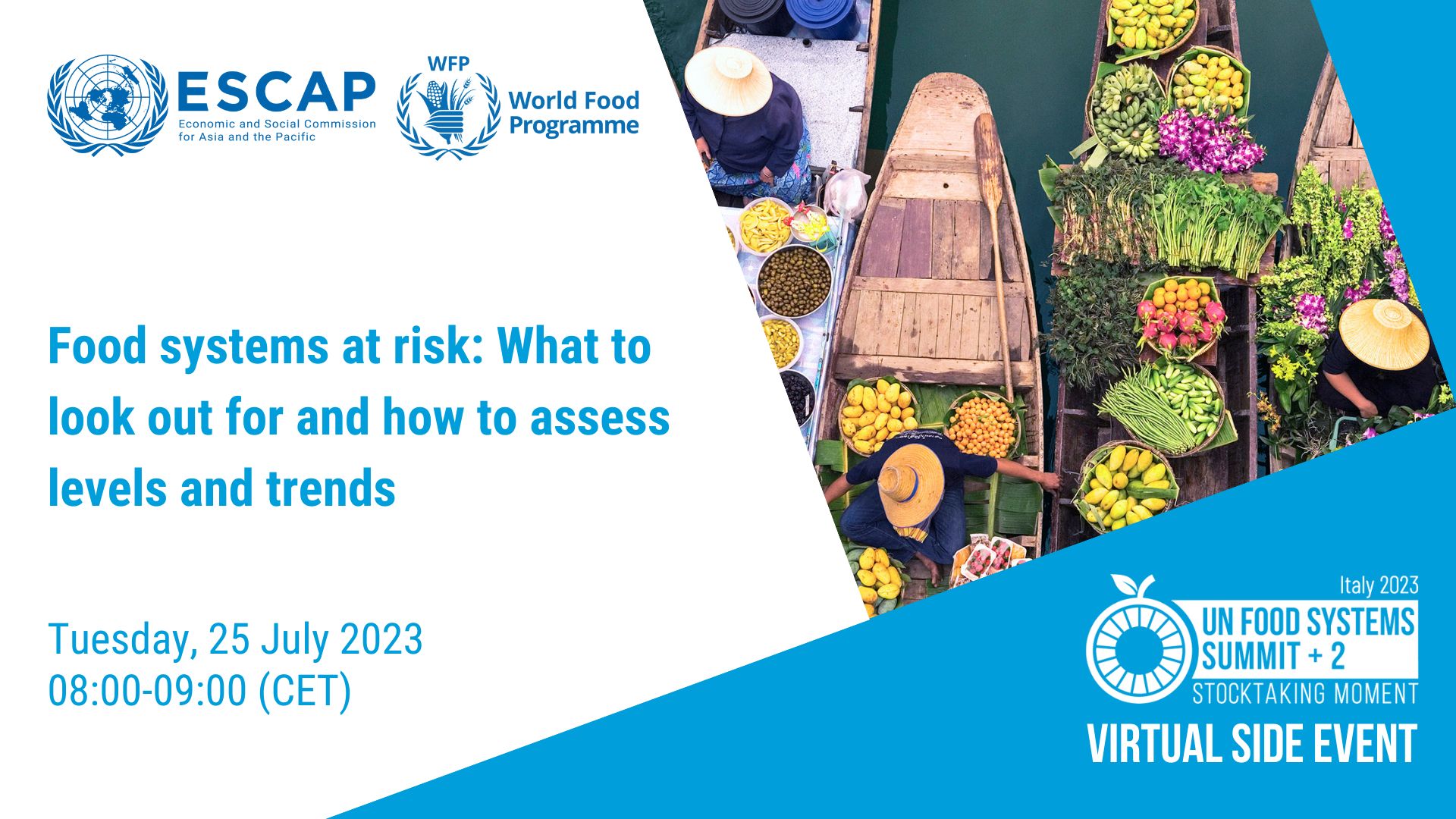
Event webpage | Registration link
Lead organizers: ESCAP / WFP
About this side event: Risk-informed implementation of food systems transformation pathways is critical for building resilient, healthy, sustainable, and equitable food systems. Organized by ESCAP and WFP, this event will discuss food system risks to look out for and some countries’ approaches to addressing these risks in the context of climate change, conflicts, epidemics, trade disruptions, price shocks, and other compounding crises. The event will also introduce a practical tool that provides insights into food system risk drivers and trends which can support policymakers and development partners to identify key areas for policy interventions.
Midday: In-person/hybrid side events
.jpg?sfvrsn=7599ebab_1)
Watch this side event here.
Lead organizer: Welthungerhilfe e.V.
Co-organizer: TMG Research gGmbH / German Federal Government (BMZ/ BMEL) / Right to Food Coalition Kenya / Inter-continental Network of Organic Famers Organisations
Despite their crucial role in shaping food systems transformation, civil society actors and marginalized groups face significant barriers to meaningful participation in food systems governance, particularly as civic space is increasingly restricted in many countries. The event will explore how transparent and inclusive processes can be established and strengthened at national and subnational levels that address power imbalances and ensure that civil society actors can participate on an equal footing in shaping decision-making on food systems transformation and hold governments accountable.
Read more about this side event: Information leaflet
4a8210be-ea96-475c-a36a-87b486987462.jpg?sfvrsn=6b698045_1)
Watch this side event here.
Lead organizers: World Farmers’ Organisation (WFO) / International Livestock Research Institute (ILRI) / International Dairy Federation (IDF) / Ministry of Agriculture and Livestock Development of Kenya
Co-organizers: Federal Office for Agriculture, Switzerland / Food and Agriculture Organization of the United Nations (FAO) Animal Production and Health Division / Global Sustainable Livestock Coalition / Sustainable Productivity Growth Coalition-US / Family Farming Coalition / International Meat Secretariat / International Poultry Council / International Feed Industry Federation / Health for Animals / Global Dairy Platform / Global Roundtable for Sustainable Beef / Alliance of Bioversity International and CIAT / University of Edinburgh, Global Academy of Agriculture and Food Systems / Soil4Climate
A coherent policy framework, coordinated institutional approach and stakeholder involvement are crucial for the livestock sector to meet rising demand for animal-based food and achieve positive social, economic, and environmental outcomes. The session will discuss international consensus on livestock issues and priorities and offer insights into on-the-ground developments. By adopting a food system lens and sustainable practices, the sector can drive transformative change towards more productive, equitable and sustainable food systems.
Read more about this side event: Information leaflet
.jpg?sfvrsn=e1a33f92_1)
Watch this side event here.
Lead organizers: Arab Organization for Agriculture Development (AOAD)
Co-organizers: United Nations Economic and Social Commission for Western Asia (ESCWA) / Coalition of Action on Healthy Diet from Sustainable Food Systems from Children and All (HDSFS) / Climate Resilient Food Systems Alliance (CRFS Alliance) / Fighting Food Crises along the HDP Nexus Coalition (HDP Nexus Coalition) / Social Protection and Food Systems Transformation Coalition (Social Protection Coalition) / Swedish International Development Cooperation Agency (Sida)
The side event will create a conducive space and enabling environment for countries to review progress on commitments to action made during the Food Systems Summit, highlight best practices and identify bottlenecks. Speakers will share inspiring examples of action showing early signs of transformation enhancing food systems resilience and sustainability in fragile settings. The discussions will aim to solidify global understanding of the role of sustainable, equitable, inclusive, healthy, and resilient food systems in rescuing the SDGs towards resilience. It will also highlight operationalization of existing climate-sensitive and nutrition-sensitive coordination platforms within countries to provide clarity and consistency across the humanitarian-development-peace domains.
Read more about this side event: Information leaflet
d900ada3-4386-4965-b04e-b8e0f10ef6b2.jpg?sfvrsn=2609bf3_1)
Watch this side event here.
Lead organizers: Nigeria, Federal Ministry of Finance, Budget and National Planning
Co-organizers: Nigeria, Federal Ministry of Agriculture and Rural Development / United Nations (WFP, IFAD, FAO and UNICEF) / Global Alliance for Improved Nutrition (GAIN) / Nigeria Fish Trawlers Association
The Government of Nigeria is committed to the implementation of the food systems transformation pathways with focus on collaborative and all-inclusive implementation strategy leveraging strong multi-sectoral and multi-stakeholder consultations through decentralized coordination and reporting across all the six Geo-political Zones including Federal Capital Territory. This is in addition to setting up National Steering Committee involving all the six Geo-political Zones, Multi-stakeholder Technical Working Groups and Implementation Task Team. This Side Event will increase visibility on the on-going efforts, provide learnings opportunities, galvanize technical assistance, mobilize private sector and diaspora support towards implementation of Nigerian food systems transformation pathways.
Read more about this side event: Information leaflet
da404cf7-2d29-4bd9-af5d-a1544dc52f6a.jpg?sfvrsn=5be4021e_1)
Watch this side event here.
Lead organizers: Wageningen University & Research
Co-organizers: World Farmers’ Organisation / CGIAR & IWMI / Dutch Ministry of Foreign Affairs / Dutch Ministry of Agriculture, Nature and Food Safety / Climate Resilient Food Systems (CRFS) Alliance / World bank
Water plays a key role in food systems and is crucial for food security. Though the interlinkages between water and food security are increasingly recognized, only one-third of National Food Security Pathways mention water. This side-event builds on an analysis of the National Pathways and on the outcomes of the UN Water Conference, in which improved resilience of food systems to reduce the unsustainable use of water was highlighted as a game changer. To drive change towards water and food security, concerted action is required. All actors in the food system must take responsibility. In this side-event we will discuss how actions for water and food security of different actors could be materialized.
Read more information about this side event: Information leaflet
.jpg?sfvrsn=5b68c4b2_1)
Watch this side event here.
Lead organizers: Government of Malawi, Ministry of Health, Department of Nutrition, HIV and AIDs
Co-organizers: SDG2 Advocacy Hub / Shamba Centre for Food and Climate / World Vision Malawi / Zero Hunger Coalition / Hungry for Action / Government of Madagascar, Ministry of Agriculture and Livestock / German Federal Ministry for Economic Cooperation and Development / European Commission / WFP / FAO / University of Notre Dame / Hesat2030
Bridging humanitarian and system change agendas, this side event recognizes the global food crisis as a major hurdle to SDG2. It serves as a call to action to urgently enhance the resilience of financial, health and environmental systems, and accelerate food systems transformation. At its core is the launch of Hesat2030, a visionary global roadmap dedicated to developing and implementing costed and evidence-based solutions that effectively transform food systems to deliver healthy diets for all in a sustainable way. This side event will synthesize lessons from the global food crisis, profile pertinent research embedded in country contexts and showcase joint advocacy to break the cycle of crises.
Read more about this side event: Information leaflet
Afternoon: High-level event hosted by the Government of Italy
.jpg?sfvrsn=67700eac_1)
Time: 14:30-17:30
Room: Malaysia - B227
Hosted by the Government of Italy
By invitation only
Oceans and seas play a crucial role for ecosystems, food security, the transportation of goods and services, particularly for Small Island Developing States (SIDS). It is widely visible that seas are subjected to increasing pressure that alters their functions, threatens biodiversity, reduces natural and economic resources. In this context, SIDS bear the greatest burden in terms of climate change. However, they are not alone in facing the challenges ahead.
Exchange of experiences and practices from different countries is key to raise awareness and develop joint adaptation strategies for changing oceans and seas. This is why ensuring “Healthy and Sustainable Oceans” is a priority to be achieved by 2030, in line with SDG 14 “Life Below Water”. In this context, marine protected areas play a crucial role in log-term conservation, by supporting climate change adaptation and mitigation while providing other ecosystems services.
This event aims to promote action-oriented partnerships among SIDS and other national and international stakeholders attending the event. These partnerships can build on existing best practices and lessons learned in terms of reducing pollution and the negative impacts of climate change on maritime natural resources; protecting oceans and seas; restoring degraded habitats.
Evening: Virtual side events
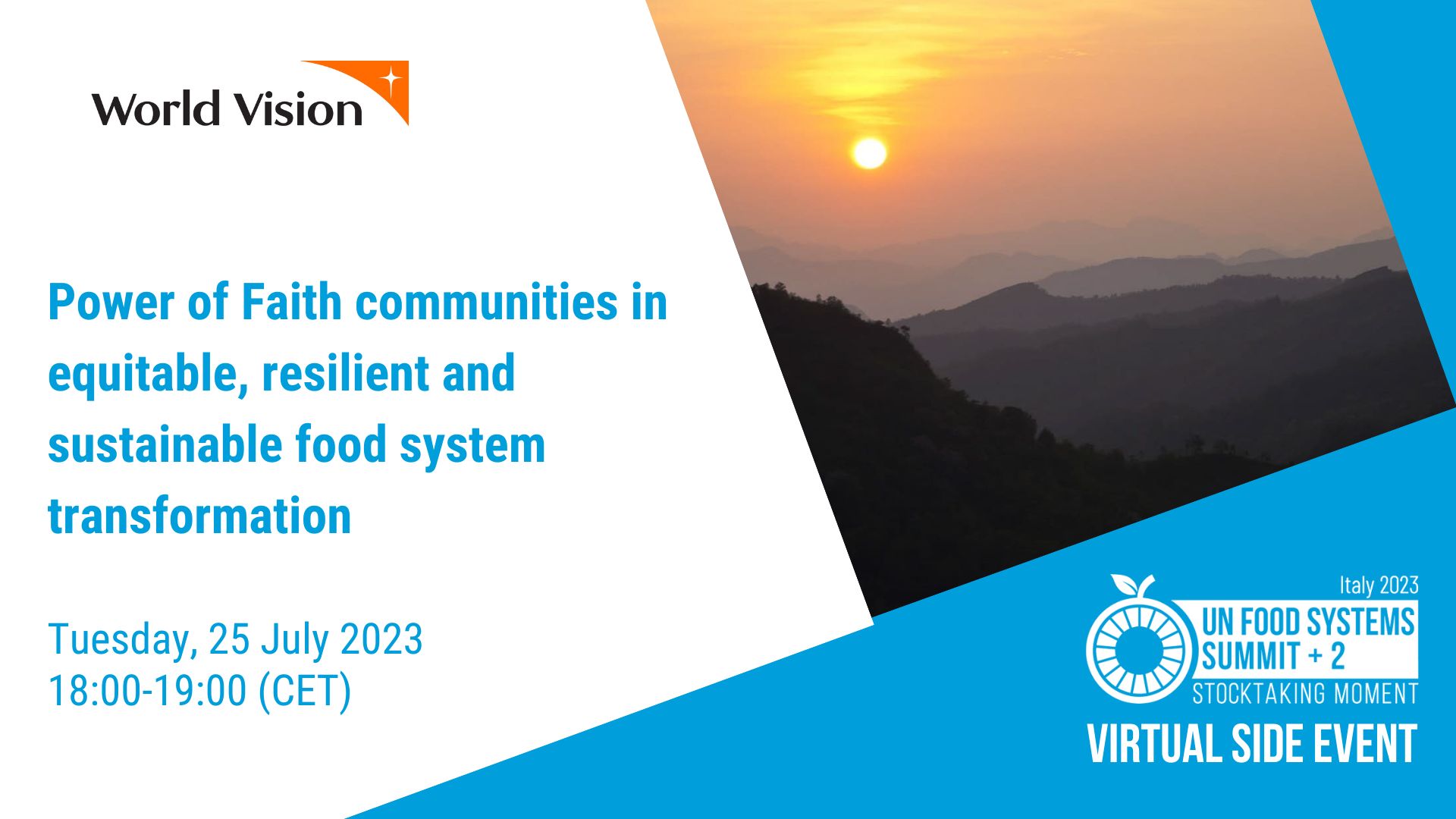
Registration link
Lead organizer: World Vision International
About this side event: In 2021, an interfaith group developed a Call to Action reflecting the Interfaith Statement which was read in the Food Systems Summit plenary. The statement challenged heads of states, Governments, civil society, faith communities and businesses to take steps together towards more nutritious, equitable and sustainable food systems. This Food Systems Summit Virtual Event is the final in a 3-part dialogue series revisiting this statement in discussions with international leaders, policy makers and grassroots faith actors to provide an essential stock-taking update in good practice and opportunities to strengthen faith engagement in food systems transformation.
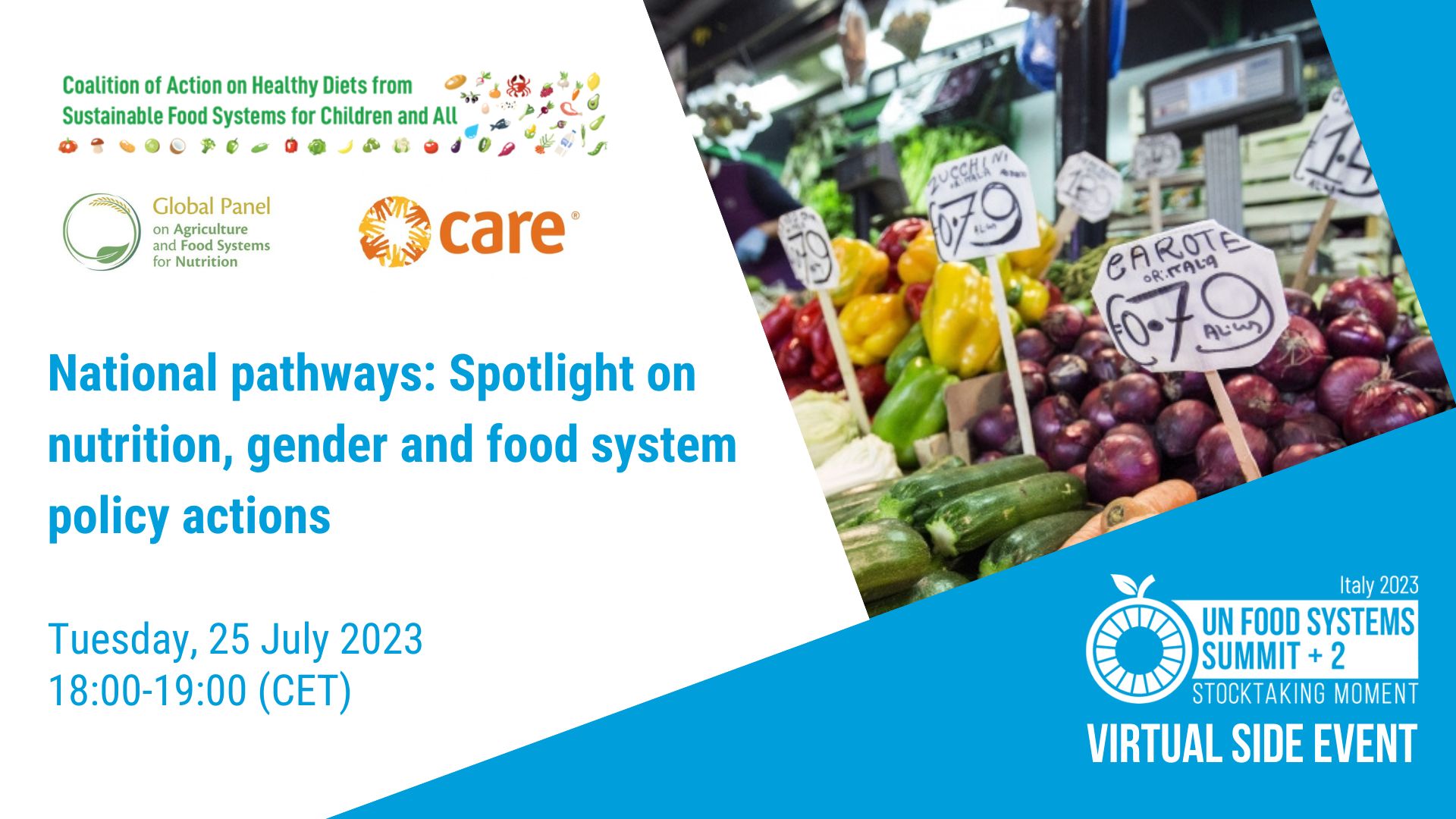
Registration link
Lead organizers: WHO Nutrition / Global Panel on Agriculture and Food System for Nutrition/ CARE
About this side event: UNFSS garnered global attention to the need to transform our food systems to ensure they contribute positively to people’s nutrition and health, while protecting our planet. Countries submitted national pathways detailing their commitment and strategy towards food system transformation. The Global Panel on Agriculture and Food System for Nutrition, CARE and the World Health Organization (WHO) analysed the pathways to determine how successfully health, nutrition, gender equality and systemic issues, including environment and implementation policy actions were integrated into these pathways.
This event will present a snapshot of how nutrition and health policy actions are integrated in food system transformation, while taking a broader systematic approach. Sharing experiences from national conveners will provide an opportunity to learn how nutrition and gender policy action can be successfully integrated in national pathways to ensure they will deliver healthy diets from sustainable food systems for all!
Registration link
Lead organizers: International Organisation for Migration / Food and Agriculture Office of the United Nations
About this side event: During the UN FSS+2, IOM and FAO will hold an online discussion on the role of migration as a powerful driver of sustainable systems, adaptation, and resilience in the face of food insecurity.
This side-event will take place on Tuesday 25 July, 18:00-19:00 CEST (online) within the main programme of the Summit on “Resilience and Future Proofing”.
Panellists will engage in a timely exchange on food systems transformations and national pathways that recognize the role of safe, orderly, and regular migration in achieving sustainable food systems. The discussion will also explore the importance of policy coherence for food system transformation and of the roles of different actors to ensure it.
The event will gather representatives of governments, private sector, diaspora and UN organizations, among others.
Time: 18:00-19:00 (CET)
Registration link
Lead organizer: Executive Secretariat from Community of Portuguese Speaking Countries (CPLP)
Co-organisers: FAO / Actuar - representing the Secretariat of the Civil Society Mechanism in CONSAN-CPLP / Ministry of Agriculture and Environment of Cape Verde / Mechanism to Facilitate Academia's Participation in CONSAN-CPL
About this side event: The 2023 Stocktaking Moment will build momentum for implementation of national food system transformation pathways developed in the context of the 2021 Food Systems Summit.
They can be accelerated, and their impact can be more significant if all relevant actors, all sectoral areas, and all levels of decision-making are involved. In other words, adequate governance mechanisms are essential for the inclusive implementation of national food system transformation pathways.
By adopting a territorial approach for food systems governance, member states are able to gather relevant stakeholders from various spatial levels, including national, subnational, and international to collaborate, increase coordination and develop more effective context-specific solutions for creating more equitable and sustainable food systems.
Building on previous events including a parallel session in the UNFSS and collaboration with FAO, UNEP; GIZ and other organizations gathered in the “ad hoc working group for territorial governance”, this side event will continue the dialogue to address major challenges to build inclusive food systems governance mechanisms using a territorial approach.
.jpg?sfvrsn=cc7a02d5_1)
Event link
Lead organizer: University of Camerino (UNICAM)
About this side event: Climate change is a global challenge that requires urgent comprehensive and cross-sectoral action, including across agri-food systems. Such process needs to be taken into full consideration of international goals and agreements, as the 2030 Agenda for Sustainable Development and its universally agreed Sustainable Development Goals (SDGs), the Rio Declaration on Environment and Development and the Paris Agreement. This action also needs to be rooted in the economic, social and environmental dimensions of sustainable development.
The urgency to act on climate change impacts on agri-food systems has never been clearer, as indicated by the latest reports of the Intergovernmental Panel on Climate Change (IPCC). Agri-food systems must become more resilient to the current and future impacts of climate change, learning from good practices to promote transformative adaptation policies, plans and actions to achieve food security. The Paris Agreement calls for holding the increase in the global average temperature to well below 2 °C above preindustrial levels and pursuing efforts to limit the temperature increase to 1.5 °C above pre-industrial levels. These commitments demand rapid, deep and sustained reductions in global greenhouse gas emissions, including from agri-food systems. At the same time, Climate actions need to be developed to adapt to climate change threats, such as changing rainfall patterns, drought, flooding and the geographical redistribution of pests and diseases.
Innovation and research help guide actions to transform agri-food systems towards resilient, sustainable and climate resilient practices.
AgrI-fiSh project, funded under Horizon2020-PRIMA, intends to showcase an applicable innovative circular model to be applied at national levels to increase the resilience of communities, while improving livelihood and competitiveness.
The project promotes the use of innovative and plant-based feeds for a sustainable aquaculture deriving from agricultural wastes. The research communities will promote cooperation with the private sector and stakeholders at local and national levels, through capacity building among Algeria, Italy and Spain
Evening event hosted by the World Farmers Market Coalition
e89a0bd8-8bbf-44f9-99d9-f402979a7b9c.jpg?sfvrsn=ebec7b1e_1)
Time: 19:00-22:00
Location: Mercato Campagna Amica, Via San Teodoro, 74
The Ministry of Foreign Affairs and International Cooperation, the Ministry of Agriculture, Food Sovereignty and Forests, Coldiretti, and the World Farmers Markets Coalition (WFMC) on the occasion of the UN Food System Summit+2 - Stocktaking Moment have organized an evening event where participants will experience the products and specialties of Italian farmers producers and chefs. The event will be dedicated to presenting the World Farmers Market Coalition.
The invitation is open to Heads of Delegation for a seated dinner and for wider members of delegation for an open reception. Please register at the RSVP ([email protected]).
Wednesday, 26 July 2023
Morning: Virtual side events
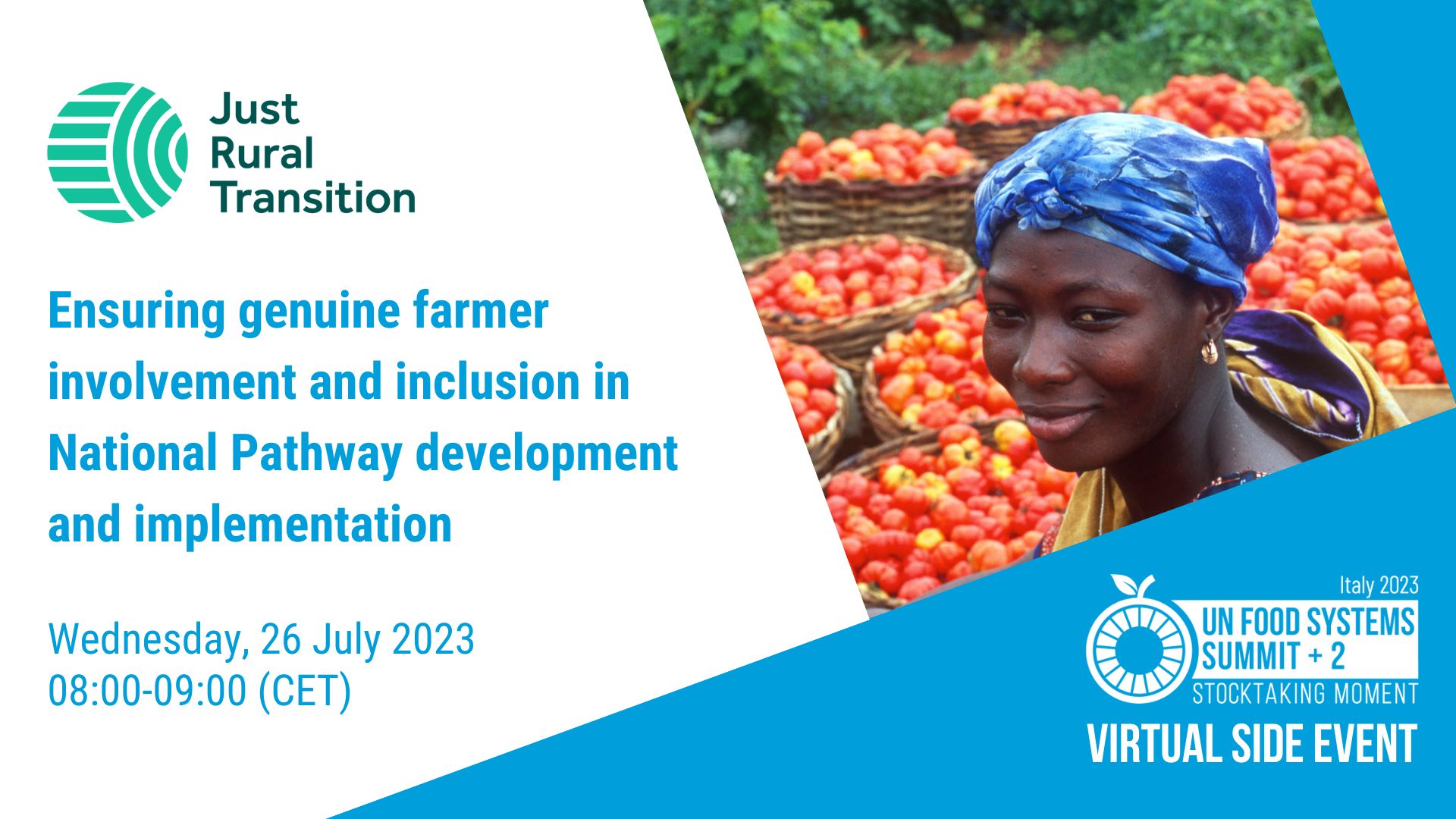
Registration link
Lead organizer: Just Rural Transition Initiative
About this side event: Multi-stakeholder involvement is central to the development and implementation of Food Systems National Pathways. Farmers will be responsible for many of the changes needed on the ground to respond to the challenges of meeting the triple objectives of food and nutrition security, climate change mitigation and adaptation, and halting and reversing biodiversity loss. Such changes will have knock-on effects across the food system.
To fulfil their role and help to bridge the implementation gap that still exists between the current situation and countries’ ambitions, farmers need to be fully involved in the process of designing and rolling out national pathways, and other upcoming processes. This event will bring together representatives from regional farmer organisations and international initiatives to promote a just transition to sustainable food systems and discuss their experience in participating in national pathways, featuring positive examples from countries and highlighting challenges to genuine farmer influence over the design and implementation of national pathways.
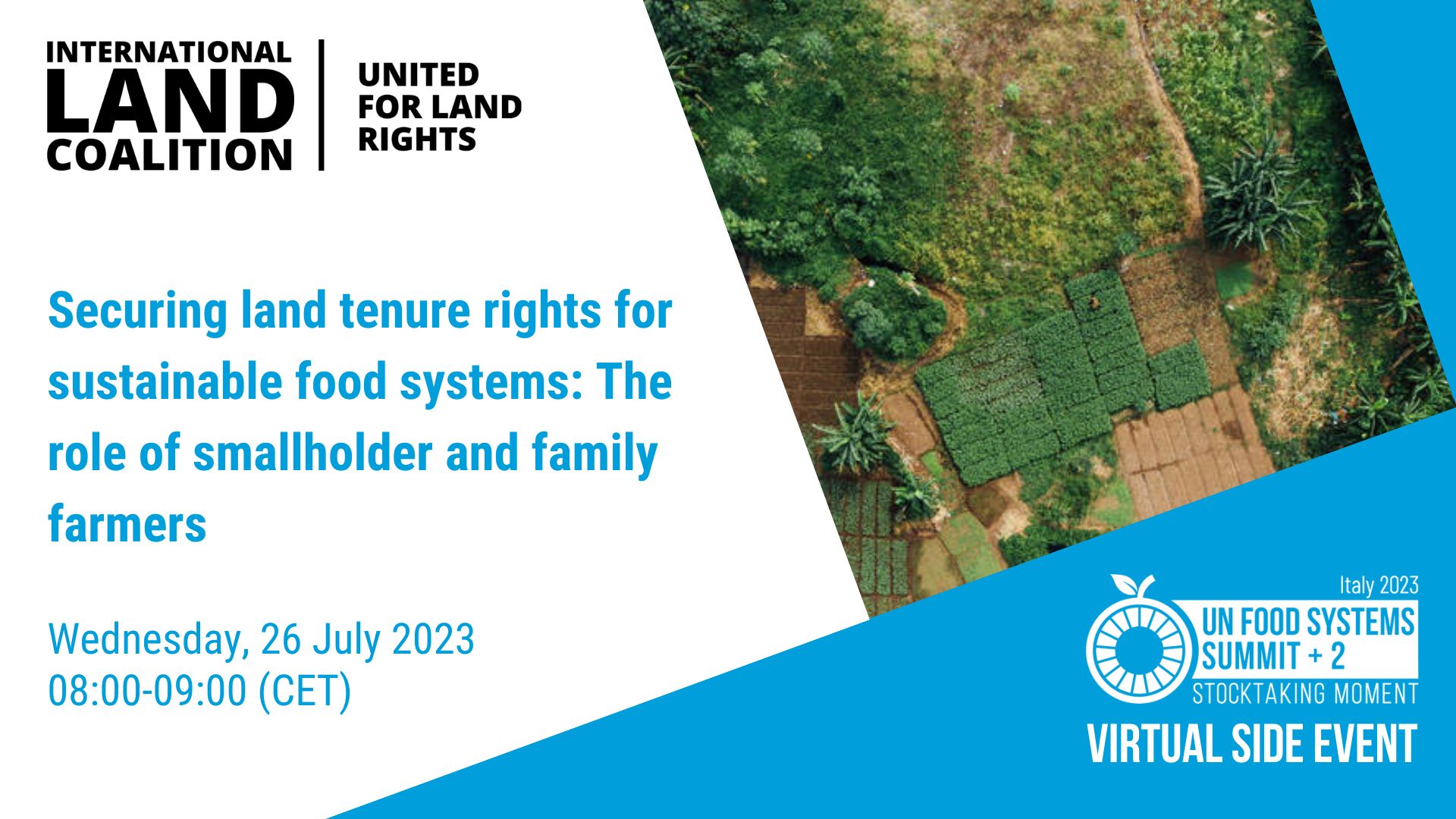
Registration link
Lead organizer: International Land Coalition (ILC)
Co-organizers: International Fund for Agricultural Development (IFAD) / Confederation of Organizations of Family Producers of the Expanded Mercosur (COPROFAM) / Asian Farmer’s Association for Sustainable Rural Development (AFA) / UJAMAA COMMUNITY RESOURCE TEAM (UCRT) / World Rural Forum (WRF)
About this side event: Family Farming presents the most promising prospects for achieving the required transformation, encompassing production systems and food governance in the context of climate change and interconnected crisis. It entails the transition towards more agroecological and resilient practices, ensuring the preservation of biodiversity, efficient management of natural resources and the capacity to confront climate change while respecting the contexts, cultures, approaches and constraints of each farmer. Secure tenure of land is the cornerstone of this transition: meeting the right conditions to invest, protect, and restore their land, accessing credit, improving farming techniques to fight against land degradation and improving productivity sustainably.
Bringing in the voices of smallholder and family farmers organisations, including pastoralists, to the STM will shine light into their enormous potential as solution providers. In connection with their long standing experience in building public policies and in the context of implementation of the United Nations Decade of Family Farming, they will share the priorities of public policies and actions related to securing land tenure to be included in their national pathways.
As a follow up, the farmers and pastoralists organizations will continue strengthening multistakeholder dialogue and policy processes to drive the transformation towards more sustainable, resilient, socially and culturally appropriate and nutrition-sensitive food systems.
Midday: In-person/hybrid side events
.jpg?sfvrsn=d9c59ecb_1)
Watch this side event here.
Lead organizer: World Farmers Markets Coalition
Co-organizer: Resilient Local Food Supply Chains Alliance
Local fresh food markets are key to deliver stability, to transform food systems for sustainability and resilience, and to implement the Sustainable Development Goals. Farmers markets build economic, social, and political links between urban and rural communities. The recurring and organized farmers markets not only stimulate the local economy, but also change consumer behavior, create inclusive civic space, promote biodiversity, traditional knowledge whilst incubating entrepreneurial innovation. With this event, we intend to achieve a twofold objective: build greater awareness of the farmers market model to deliver food security, food quality, and the protection of resources and communities and to lay the foundation for constructive, long-term, and multi-level dialogues.
Read more about this side event: Information leaflet
.jpg?sfvrsn=c31f076e_1)
Watch this side event here.
Lead organizers: United Nations Development Programme (UNDP) / Netherlands Food Partnership
Co-organizers: Food and Agriculture Organization of the United Nations (FAO) / United Nations Environment Programme (UNEP) / Foresight4 Food, University of Oxford UK/ Wageningen University & Research, Netherlands / GAIN, the Global Alliance for Improved Nutrition
This side-event will share good practices and country experiences on how to effectively operationalise cross-sectoral and multi-stakeholder collaboration for sustainable food systems transformation. Representatives of selected countries in Africa, Asia and Europe will share their experiences in fostering collaboration between stakeholders in the context of the development, refining and implementation of the national pathways and related policies for sustainable food systems. The session will provide space for exchange about the practical use of concepts and approaches to facilitate multi-stakeholder collaboration. Panellists will bring hands-on experiences in multi-stakeholder initiatives to discuss how national governments and partners can strengthen inclusive governance mechanisms that support sustainable food systems transformation.
Read more about this side event: Information leaflet
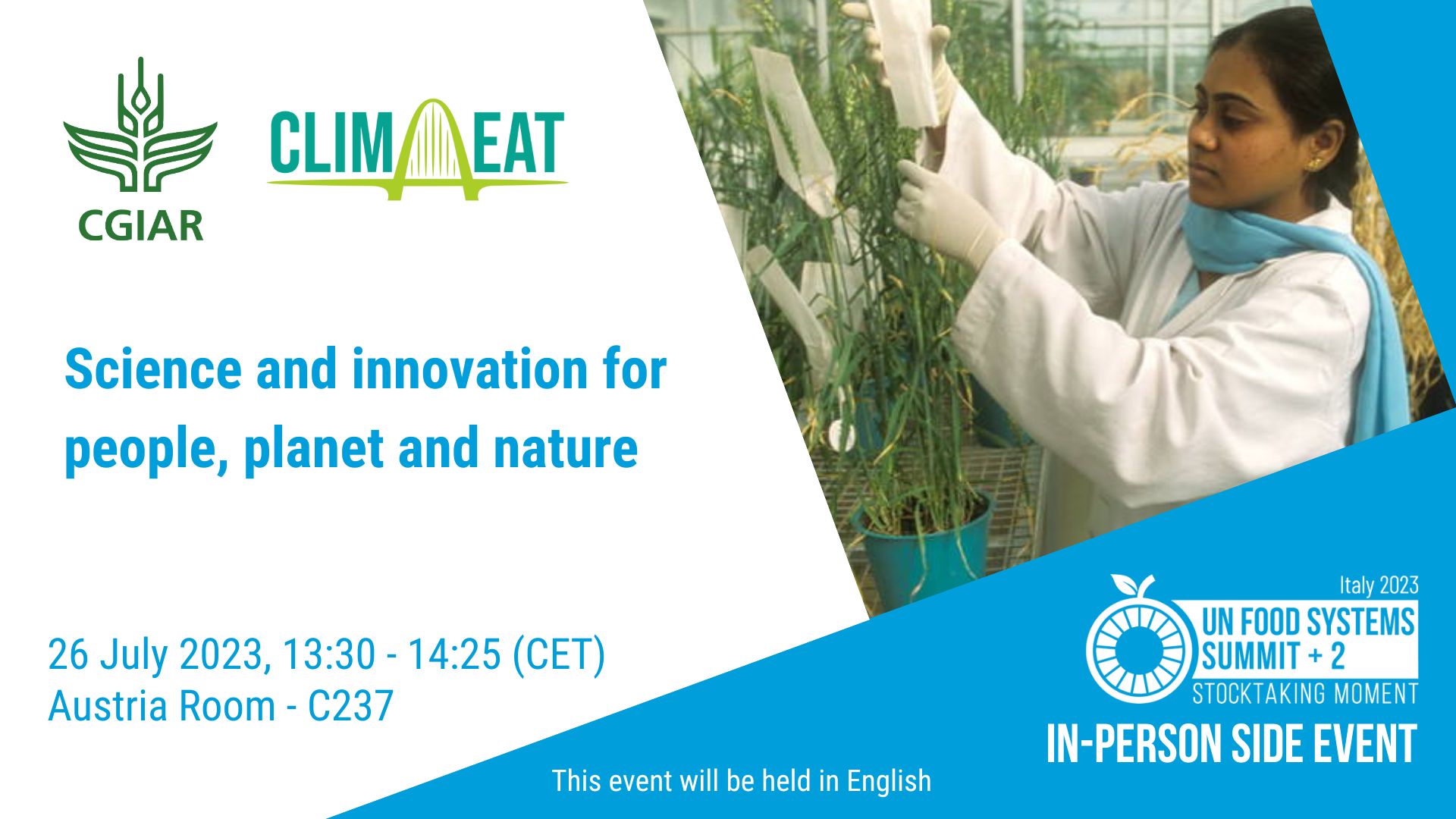
Watch this side event now.
Lead organizers: CGIAR / Clim-Eat
Co-organizers: Foreign, Commonwealth and Development Office, United Kingdom / IFAD / The Netherlands
Today’s knowledge, technologies, and innovative approaches can turn negative relationship between food systems and climate change into a positive and mutually beneficial one. This event will outline how international cooperation on priority technology areas identified as part of the Breakthrough Agenda can sustainably increase agricultural productivity and incomes, reduce GHG emissions, safeguard soil, water resources, and natural ecosystems, and build climate resilience. It will look at how the enabling environment–changes in governance, policy and investments—can accelerate the transformative potential of these innovations and the flow of international climate finance to deliver the SDGs and a nature-positive food-secure future.
Read more about this side event: Information leaflet
3638641c-fd94-49f9-9a12-da12c622f674.jpg?sfvrsn=b1d409cf_1)
Watch this side event here
Lead organizer: Private Sector Mechanism
Co-organizers: WBCSD / AGRA / Zero Hunger Pledge
The event will review progress on the implementation of Private Sector Commitments and discuss additional options for effectively mobilising the private sector towards impactful action for a regenerative and equitable food system that provides healthy, safe and nutritious food for all.
The proposed side event will specifically address how the private sector is advancing the zero-hunger goal and sustainably transforming food systems, taking forward commitments, such as those made as part of the Zero Hunger Private Sector Pledge. The event will also be an opportunity to reflect on the investments pledged to date (more than half a billion dollars committed by 44 companies in 47 countries) as well as on ambitions for the future.
Read more about this side event: Information leaflet
.jpg?sfvrsn=6cdbcf19_1)
Watch this side event here.
Lead organizer: Decent Work for Equitable Food Systems Coalition
Co-organizers: IFAD / CARE / WBCSD
A critical requirement of food systems transformation is decent work for food systems workers and building agency in the sector is a key pillar to fulfil this requirement. Co-hosted by the Decent Work Coalition for Equitable Food Systems, this event will showcase current work plans, initiatives and implementation successes of diverse actors driving more equitable livelihoods for young people and vulnerable communities. The aim of this session is to establish new connections and entry points for the Coalition to accelerate action at national level and advance equitable food systems globally.
Read more about this side event: Information leaflet
c28cc61a-2279-4237-82ad-239ce35732cf.jpg?sfvrsn=845c83e2_1)
Watch this side event here.
Lead organizer: Coalition for Action “Making Food Systems Work for Women and Girls”
Co-organizers: IFPRI / USAID / Global 5050
This side event aims to present new evidence to take stock of the situation of women in food systems transformation and provide recommendations to countries regarding gender transformative approaches and the collection of data on the disparities in different realms of food systems. The event forecasts a discussion on two reports: First, FAO’s new Status of Women in Agrifood Systems report, which provides specific recommendations and lessons on how to increase the linkages between gender equality, women’s empowerment and food systems transformation for the achievement of poverty reduction and food security. Second, The Global Food 50/50 report 2022, which will provide key data on tracking and promoting progress on gender equality and emerging trends, challenges, and opportunities for a global food system that is accountable for progress toward gender equality.
Read more about this side event: Information leaflet
5b0b3d54-65e1-46e7-befa-30efcb5b352d.jpg?sfvrsn=939477a9_1)
Watch this side event here.
Lead organizer: Simon Fraser University
Co-organizers: British Columbia Ministry of Agriculture and Food / Institutional Partnership and Strategies Feed BC
Join us in exploring the transformative Simon Fraser University and Feed BC partnership, a pioneering journey towards local food resilience. Learn from our multifaceted panel - researchers, indigenous culinary innovators, private sector, and social entrepreneurs - as they unravel the path to achieving a remarkable 40% local sourcing goal. This robust conversation will stimulate fresh perspectives and inspire action towards food system transformation. Witness the power of collaboration in fostering regional economies and discover how SFU is paving the way to attain 50% local food procurement. This event intricately ties into the UN's Sustainable Development Goals, underlining the significance of sustainable consumption and production. Be part of the solution, and help shape our shared future!
Read more about this side event: Information leaflet
.jpg?sfvrsn=319286fc_1)
Watch this side event
Lead organizer: SEED at adelphi research
Co-organizers: United Nations Environment Programme / Ministry of Agriculture, Netherlands / Government of Flanders, Belgium / Food and Agriculture Organisation / Listen Field / WuchiWami
The side-event will showcase new models and approaches for supporting agrifood systems transformation. The event will serve as a platform to exchange about scalable instruments between different stakeholders and initiatives in the agrifood system. Together with partners from Governments, international organisations and business partners, the event will demonstrate the importance of well-designed collaborations and the necessity to enable and catalyse innovations for an effective food system transformation, while contributing to accelerating SDG implementation in the local context. The initiatives proposed by this event will be taken up by the FAO-SEED SDG-Agrifood Accelerator Programme.
Read more about this side event: Information leaflet
.jpg?sfvrsn=59b757b9_1)
Watch this side event here
Lead organizers: Act4Food / Young Professionals for Agricultural Development (YPARD)
Co-organizers: World Food Forum (WFF) / Good Food - China Food Systems Action Hub / YOUNGO / Proveg International / EIT Food / Irish Forum for International Agricultural Development / Bites of Transfoodmation / Real Food Systems / Clim-Eat / Switzerland
This event assesses progress made by young people, highlights the Youth Declaration on Food Systems, and explores challenges faced by young people in creating change in food systems transformation. We will discuss roadblocks and innovative solutions for sustained youth engagement, aligning with the UNFSS objective of inclusivity. Our focus on systemic barriers supports the FSS integrated narrative. The event aims to contribute to national food systems transformation and UNFSS National Pathways. Expected outcomes include a youth coalition, a roadmap for youth inclusion and enhanced collaboration among youth leaders. Join us to drive change in global food systems.
Read more about this side event: Information leaflet
b1236a3f-c4a4-4176-a68d-687556b94d1c.jpg?sfvrsn=82315124_1)
Watch this side event here.
Lead organizers: Guatemala
Co-organizers: Guyana / Peru / WFP / FAO / IFAD
With this side event, policymakers and government entities will be exposed to three concrete examples of the importance of National Pathways as a tool to develop and align public policies related to food systems. Guatemala, Peru, and Guyana are good examples where pathways have been used as a tool to analyse and align public policies – such as food security, social protection, and school feeding – to a common agenda towards food systems transformation. Additionally, the side event will showcase the role of the UN agencies and the ecosystem of support at regional level, articulating and strengthening support at country level and allowing countries to tap into regional capacities.
Read more about this side event: English | Español

